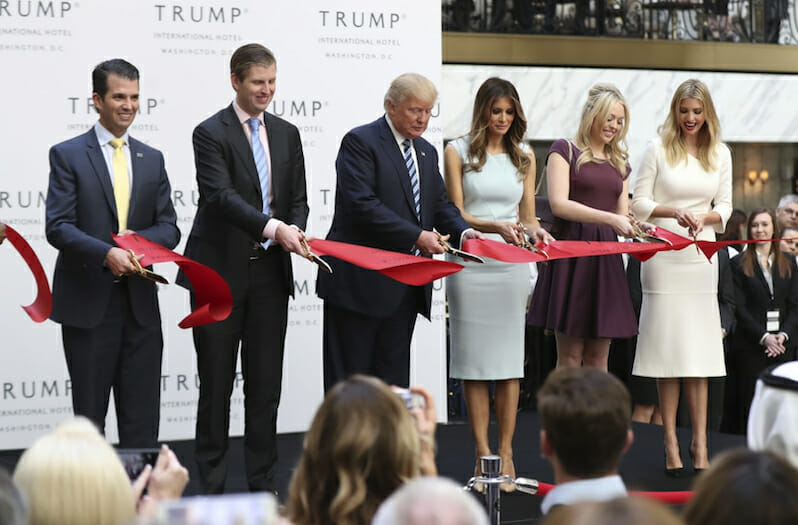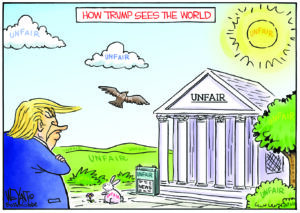Trump Is Reported to Be Discussing Possibility of Pardoning Himself, Relatives or Aides
Legal options are explored by the president as special counsel Robert Mueller turns to the Trump family’s personal finances, The Washington Post says. Donald Trump and his family during the grand opening of Trump International Hotel in Washington, D.C., in October. (Manuel Balce Ceneta / AP)
Donald Trump and his family during the grand opening of Trump International Hotel in Washington, D.C., in October. (Manuel Balce Ceneta / AP)
Donald Trump and his family during the grand opening of Trump International Hotel in Washington, D.C., in October. (Manuel Balce Ceneta / AP)
Just when you think Donald Trump’s presidency can’t get any stranger, it does.
After the partial transcript of his odd interview with The New York Times was released Wednesday, The Washington Post reported that Trump is discussing with lawyers the possibility of pardoning himself, his family and close aides in order to undercut special counsel Robert Mueller’s probe into allegations that the Trump presidential campaign colluded with Russia to influence the 2016 election—an investigation that Trump has long called “a witch hunt.”
In the Times interview, Trump says he believes Mueller would be going too far with the investigation if he looked into the Trump family’s personal finances:
[MICHAEL S.] SCHMIDT: Last thing, if Mueller was looking at your finances and your family finances, unrelated to Russia — is that a red line?
[MAGGIE] HABERMAN: Would that be a breach of what his actual charge is?
TRUMP: I would say yeah. I would say yes.
However, Trump’s businesses have had dealings with Russia for years, which makes the boundaries of the investigation less concrete. The Justice Department’s order of May 17 instructed Mueller to conduct an investigation into “any links and/or coordination between the Russian government and individuals associated with the campaign” as well as “any matters that arose or may arise directly from the investigation.” Both the Times and Bloomberg have reported that Mueller is, in fact, investigating these business entanglements.
According to another Times story, the Trump team also is attempting to dig up dirt on the special counsel’s investigators in order to discredit them. Trump says that members of Mueller’s investigative team have potential conflicts of interest and that he will make them known “at some point.” These “conflicts” may include the fact that several of Mueller’s lawyers made personal donations to Barack Obama and Hillary Clinton’s campaigns, though the Department of Justice’s specific ethics guidelines for what constitutes a conflict of interest does not include “campaign donations.”
Why is the Trump team reacting this way? NBC News reports that multiple U.S. officials say Mueller is “finding the strike zone” in gathering evidence in his investigation—so it’s unsurprising that Trump is getting defensive.
The Washington Post states that Trump told aides he was particularly concerned after learning that Mueller would be able to access several years of his tax returns. Trump’s refusal to reveal his recent returns breaks the string of such disclosures by every president since Jimmy Carter.
Also notable is the likelihood that in order to fire Mueller, Trump would first have to fire Attorney General Jeff Sessions. This could explain Trump’s complaints levied against Sessions in the Times interview when he said it was “extremely unfair” for Sessions to recuse himself from overseeing the Russia investigation. Sessions brushed off these comments, saying he plans “to continue to [be the attorney general] as long as that is appropriate” and that his team “wholeheartedly” shares the priorities of the Trump administration. According to The Washington Post:
Some Republicans in frequent touch with the White House said they viewed the president’s decision to publicly air his disappointment with Sessions as a warning sign that the attorney general’s days were numbered. Several senior aides were described as “stunned” when Sessions announced Thursday morning he would stay on at the Justice Department.
Another Republican in touch with the administration described the public steps as part of a broader effort aimed at “laying the groundwork to fire” Mueller.
“Who attacks their entire Justice Department?” this person said. “It’s insane.”
If Trump does choose to pardon family members or aides, shielding them from potential prosecution, it would raise a plethora of legal questions. According to the Post:
Currently, the discussions of pardoning authority by Trump’s legal team are purely theoretical, according to two people familiar with the ongoing conversations. But if Trump pardoned himself in the face of the ongoing Mueller investigation, it would set off a legal and political firestorm, first around the question of whether a president can use the constitutional pardon power in that way.
“This is a fiercely debated but unresolved legal question,” said Brian C. Kalt, a constitutional law expert at Michigan State University who has written extensively on the question.
If Trump pardons family members and close aides to cover up possible crimes, the action could be seen as acting “corruptly” according to federal obstruction statutes, and he could be charged with obstruction of justice.
“In Trump’s case, the question would be whether he was acting out of the goodness of his heart, or covering up for his family, his associates and himself,” according to a New York Times opinion piece.
Your support matters…Independent journalism is under threat and overshadowed by heavily funded mainstream media.
You can help level the playing field. Become a member.
Your tax-deductible contribution keeps us digging beneath the headlines to give you thought-provoking, investigative reporting and analysis that unearths what's really happening- without compromise.
Give today to support our courageous, independent journalists.






You need to be a supporter to comment.
There are currently no responses to this article.
Be the first to respond.